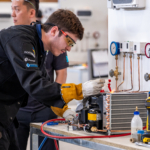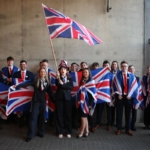‘We have a desperate shortage in this country of people with the right skills in engineering, in electrics, in construction, in digital technology… So we need to make sure that we not only properly fund all manner of technical and vocational education – from FE colleges to apprenticeships – and if I am lucky enough to be elected, we will. We need finally to do what we always promise we will – to elevate practical and technical qualifications, so that we recognise their immense value to society and to the individual’.
The man who wrote these very words earlier this month has today been confirmed as the UK’s new Prime Minister. We wish Boris Johnson well as he begins his time in 10 Downing Street with perhaps the busiest in-tray of any new Prime Minister for a generation. Of course, Brexit will be on everyone’s minds in the coming weeks and months, but the fact that the PM dedicated a whole article to skills so recently indicates the seriousness which he and his administration are going to apply to the issue which, those of us who work with our young people every day of the year know, matters so much.
I agree with the PM: we need more skills and we need more funding for skills. The UK needs a skills upgrade and at WorldSkills UK our work is all about benchmarking and mainstreaming world-class know-how so we can help not only showcase the amazing young talent being developed in the UK, but also develop world-class technical education systems. Our ambition is nothing short of helping maintain and attract investment in the UK to create rewarding careers for the next generation of highly skilled young people and help the UK economy be more globally competitive. It’s an ambition through his words that I think the PM shares, so we need to do three things to get the world-class skills upgrade I’m talking about.
We need to invest in young people. The engineering, electrics, construction and digital technology skills that the PM referenced in his article are the heartbeat of Team UK. In four weeks’ time these 37 young women and men from across England, Scotland, Wales and Northern Ireland will be out in Russia for the challenge of their lives at the Kazan Skills Olympics. If, as the PM says, we need more young people taking up skills, it’s Team UK who are surely our ultimate ambassadors to inspire the next generation to do so. Because not only does Team UK have the skills our country needs, the team members are the best of British, the best young apprentices and students we have. They set the bar to which other young people should aspire. There is no higher point of prestige in our education system than the privilege of representing your country on the world stage and we need to celebrate this much more than we have done in recent years.
We need to take a longer-term strategic view. At the Skills Olympics we are going to be facing intense competition from other major G20 nations: the USA, Russia, France, Germany China, Japan, South Korea, Brazil and others. There is a global skills race and how well you do depends not just on young people’s innate talent, but also on by how far governments are prepared to back their young people to succeed. The Russians and South Koreans have invested heavily in their teams over recent years – using WorldSkills as a key element of broader economic development strategies – and that is a big part of the reason why they are tipped to take the top two podium places next month. In the UK, we are proud of our record of top 10 finishes at these competitions, but the truth is that to reach a par with some of our other G20 rivals we need long-term investment as part of a broader skills strategy that they enjoy.
We need to mainstream global insights. Achieving high levels of success at the Skills Olympics will also become sustainable lessons into how these nations train their young people to consistently finish top of the podium. This is the principle behind the WorldSkills UK Productivity Lab about which we have been talking about recently. Because another essential component of the UK economy that requires a thorough upgrade is our world-lagging productivity. This needs to change, and the better we get at competing internationally, the more learnings we will be able to bring back and supercharge into our skills systems. In particular, the better integration of our training managers – the dedicated skills experts who are the power behind Team UK – will ensure that many thousands more young people have exposure to the world-class methodologies that lie behind the ability to bring home gold medals from the Skills Olympics.
A change in government always represents the moment to start with a clean slate and look ahead to the potential that each new day brings. There is so much that we have to look forward to in the weeks and months ahead: the Skills Olympics next month in Russia, our national finals and the amazing WorldSkills UK LIVE in November with the journey to EuroSkills Graz 2020 beginning shortly after and then on to the skills Olympics in Shanghai in 2021. With a new occupant of Number 10 Downing Street pledging to champion apprenticeships and technical skills, we have to think this can be a game-changing moment on the road to a more productive, world-class British skills system to help more young people get the best start in work and life. So, welcome Boris – our invitation to you to meet Team UK is open and we are ready to work with you and the rest of the government to celebrate these incredible young people and, in so doing, give our economy the boost it needs for now and the future.


